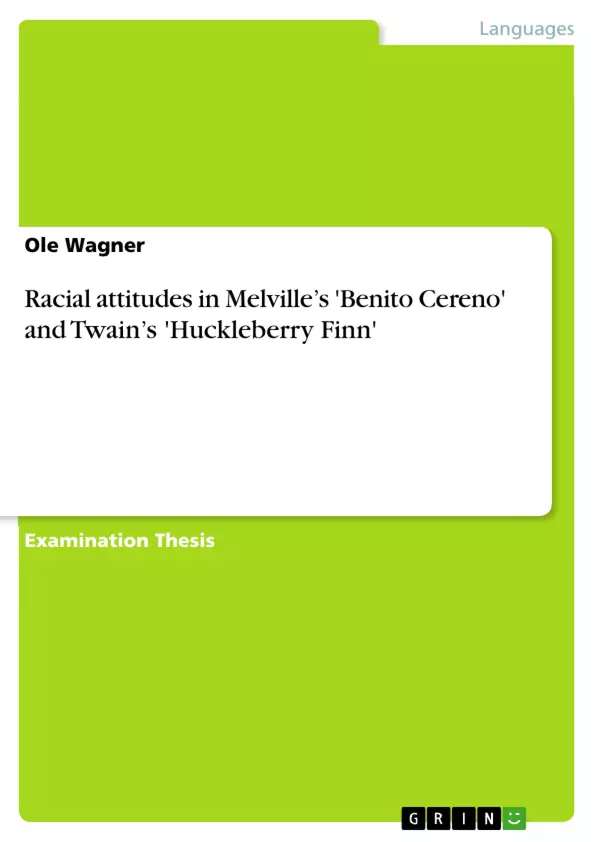The American literature is a reflection of the socio-political developments in the different stages of the history of the country, and especially slavery is a crucial topic in it. Many works dealing with slavery have been published in the 19th, 20th and 21st century, and some of them have sparked debates that are not only on literary issues. Two of these are Herman Melville’s (1819-1891) Benito Cereno (1855) and Mark Twain’s (1835-1910, born Samuel Langhorne Clemens) Adventures of Huckleberry Finn (1884). These two novels are often seen as major works in American literary history, and their authors are among the country’s most celebrated. Both books have in common that their stories play in the time before the abolition of slavery. Benito Cereno deals with a slave revolt on a ship, while Huckleberry Finn depicts the adventures of its eponymous hero and a runaway slave, Jim. Another feature the novels share is the fact that both have been charged to contain racist and pro-slavery attitudes. This paper will evaluate and analyze these assertions in order to show that they are false because they are based on misunderstandings. It aims to provide a profound delineation of the racial attitudes in the two novels.
The assumption here is that neither Melville nor Twain wrote racist novels. This shall be proven with the help of a close analysis of the narrative perspectives and literary devices used in the books. Both of the stories, as will be shown later, are told by narrators that are far from being easy to grasp without a deeper examination of their character and function. A comprehensive insight into these appears to be beneficial for a better understanding of both of the novels.
The present paper will begin with an exploration of the individual attitudes of the two authors. Although the knowledge of writers’ opinions can never be used as the sole key to a literary work’s interpretation, it can still be helpful to gain an insight into his ideas about the world he or she depicts in his or her fiction. After this, the two novels will be dealt with separately. In a first step, the assertions about each one’s racism will be delineated. Then, the narrative perspectives and other literary techniques will be thoroughly analyzed. In a last step, the novels’ racism will be evaluated with the help of the insights gained about the techniques used. It shall be shown that in the light of this, neither Benito Cereno nor Huckleberry Finn are racist books.
Inhaltsverzeichnis (Table of Contents)
- Introduction
- The Racial Attitudes of Herman Melville and Mark Twain
- Introduction
- Herman Melville
- Mark Twain
- Analysis of Benito Cereno
- Racist Attitudes in Benito Cereno
- Narrative Perspective in Benito Cereno
- Benito Cereno as an Exploration of the White Racist Mind
- Analysis of Adventures of Huckleberry Finn
- Huckleberry Finn as a Racist Novel
- Literary Techniques in Adventures of Huckleberry Finn
- Huckleberry Finn as an Indictment of Slavery and Racism
- Conclusion
Zielsetzung und Themenschwerpunkte (Objectives and Key Themes)
This paper aims to analyze the racial attitudes present in Herman Melville's *Benito Cereno* and Mark Twain's *Adventures of Huckleberry Finn*, both of which are set in the pre-abolition era of slavery in the United States. It seeks to debunk the common misinterpretation of these novels as containing pro-slavery or racist viewpoints. The paper argues that the authors' perspectives are complex and nuanced, often conveyed through unreliable narrators and intricate literary techniques.- The complex relationship between race and slavery in 19th-century American society
- The portrayal of racial attitudes in American literature
- The use of narrative perspectives and literary techniques to convey complex social and political themes
- The analysis of *Benito Cereno* and *Adventures of Huckleberry Finn* as works that challenge racist ideologies rather than promote them
- The role of interpretation and the potential for misunderstanding when analyzing literary works set in a historical context
Zusammenfassung der Kapitel (Chapter Summaries)
The first chapter introduces the topic of racial attitudes in American literature, particularly focusing on the context of slavery. It contextualizes the work within the historical and socio-political developments of the United States, emphasizing the significance of the topic and the potential for misinterpretations regarding the authors' intentions. The second chapter delves into the racial attitudes of Herman Melville and Mark Twain, examining their personal views based on available biographical data and their literary works. It acknowledges the difficulty of interpreting an author's stance solely based on their fiction but highlights the importance of considering their possible views when analyzing their works. The third chapter focuses on *Benito Cereno*, analyzing the racial attitudes present in the narrative and examining the role of the narrative perspective in shaping the reader's understanding of the story. It argues that the novel utilizes various literary techniques to explore the complexities of the white racist mind. The fourth chapter is devoted to *Adventures of Huckleberry Finn*, examining the arguments that it is a racist novel. The chapter then proceeds to analyze the literary techniques employed by Twain in the novel, specifically focusing on how he utilizes these techniques to convey an indictment of slavery and racism.
Schlüsselwörter (Keywords)
The key themes and concepts explored in this paper include: racial attitudes, slavery, American literature, Herman Melville, *Benito Cereno*, Mark Twain, *Adventures of Huckleberry Finn*, narrative perspective, literary techniques, racism, abolitionism, interpretation, and historical context.- Arbeit zitieren
- Ole Wagner (Autor:in), 2008, Racial attitudes in Melville’s 'Benito Cereno' and Twain’s 'Huckleberry Finn', München, GRIN Verlag, https://www.grin.com/document/130687



